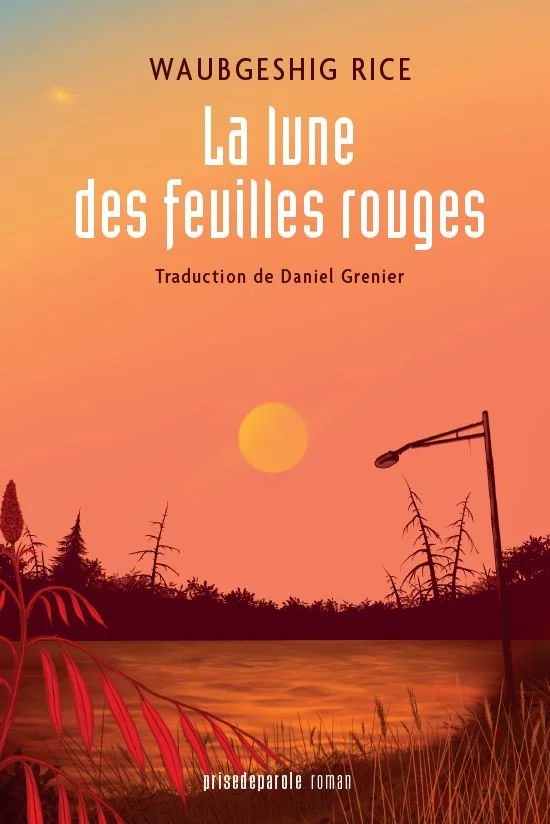Moon of the Turning Leaves
a novel by Waubgeshig Rice
EXCERPT
PIICHE SQUEEZED HER EYES TIGHT and drew a long breath into her nostrils. She let out her air long and smoothly at first, followed by a brief tremble at the end of the exhale. “Aambe,” muttered Amber. “Let’s go, it’s almost time for another one.” Maiingan looked to his partner’s eyes for an opening—any kind of recognition or awareness of the space around her—but she appeared firmly focused on bringing her baby out into this world. He continued to steadily caress her shoulders. Nicole watched her son’s eager anticipation proudly and nervously. She was excited to become a grandmother, yet anxious about her son’s soon rapid ascension into adulthood. He looked up at her from across the fire, and she saw the worry in his brown eyes. She reflexively raised the corners of her mouth in a reassuring smile, trying to comfort her son without being able to say anything or touch him.
In this immense moment, Nicole couldn’t help but reminisce about her own son’s birth nearly two decades earlier. Maiingan was her and her partner Evan’s first child. Their home community didn’t have a clinic equipped or staffed well enough to handle childbirth, and midwifery had yet to return to their people in any traditional sense. So two weeks from her due date, at the end of a snowy and cold winter, she and Evan boarded a small two-propellor plane that took off to the closest big city to the south. They stayed in a hotel for a week until the contractions began, and Maiingan was born in a bright white hospital room crowded with people in gowns and masks just two days later. Nicole remembered their rigid eyes and monotonous voices, and after all these years, she wondered if any of them was still alive. The doctors, the nurses, the pilot, and even the front desk clerk at the hotel were all likely long dead, and the buildings they worked in were probably now crumbling and decrepit. There was no way to know for sure, though, because they hadn’t left this place since the lights went out.
But life was about to emerge here once again, in their tiny settlement in the bush a half-day’s walk from their original reserve. Piiche began with a low groan, which built to another rumbling cry. Her voice faded, and she eased back in to steady, quieter breathing. Active labour had begun shortly after sundown, and as they approached midnight, the anticipation became palpable with each audible breath. Faith and Amber moved in front of Piiche, waiting for the top of the baby’s head to emerge. The elder midwife looked over her shoulder behind her, and over her duct-taped glasses, she locked eyes with Patricia and gave a slight nod.
Patricia lifted her faded ribbon skirt—once vibrantly pink, purple, and blue—and stepped around the fire with her bare, calloused feet. She gripped the hardened webbing of the back of the hand drum with her left hand, while she held the drumstick close to her chest with the other. Her grandson noticed her move and looked up at her, anticipating his next task in this salient, immemorial ceremony. Patricia walked cautiously toward the young couple. At rest, Piiche smiled as she saw her baby’s great-grandmother approach, and Maiingan’s eyes widened as he realized how close they were to meeting their child. As co-parent, he was to sing the baby into this physical world, and Patricia stepped up to hand him the drum.
“Weweni ngaman, nooshenh,” she said to the young man. He stood to receive the sacred instrument and nodded at the old woman. She handed it over with proud tears in her eyes, and he cradled it tightly against his chest. The tender transaction jolted sentiment from Nicole’s chest. Her throat tightened and tears welled in her eyes. Her stoic facade cracked at the sight of the intergenerational love between her mother-in-law and her son, preparing for the arrival yet another child of the new generation in this new world. This was how it was done now. And no one could take this ceremony and this moment from their people anymore. Those forces had disappeared in the darkness that reset the world.
Still, Nicole wanted to honour and remember the ones who couldn’t be here. She closed her eyes and saw her own mother, Theresa, vibrant and beaming before the collapse; before she wasted away to a sickness they couldn’t diagnose after everything fell apart. She imagined Piiche’s mother Monica, whom she didn’t know well at all back then, but knew couldn’t cope with the uncertainty of their new bush life when everyone was forced to leave the crumbling reserve. She disappeared into the night one spring when the river runs fast and high, never to be found again, leaving Piiche and her two younger brothers in the care of their aunt. Nicole already placed an offering of tobacco, what they called semaa, into the fire for these women and the others who couldn’t be here.
She closed her eyes to recall the childish joy Piiche always seemed to exude when she was a little girl, despite growing up without her mother for half of her budding life. But these young ones were much stronger than the adults. They adapted more smoothly to this new life in the bush. They easily forgot about past luxuries like washing machines, cars, cellphones, the Internet, and microwaves. Some of those things disappeared overnight; others faded into obsolescence in weeks and months. And the young ones didn’t seem to miss them, all these years later. The children of the regeneration continued to lead their elders beyond the end of the old world.




